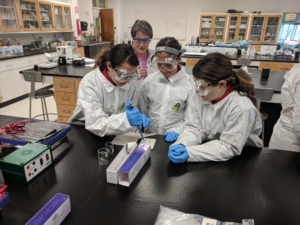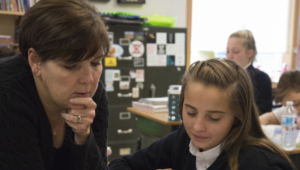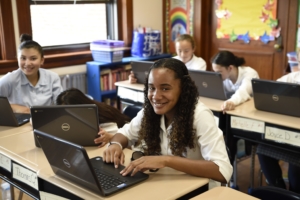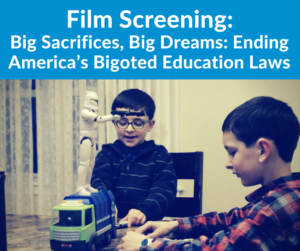$1.7 Million Investment to Improve Academics

We understand that parents choose to enroll their child(ren) in our schools, in part, because of their academic rigor. To ready children for success and to enable them to someday compete in our fast-changing and competitive global economy, our schools must provide children with a first-rate education.
To provide that first-rate education, we have undertaken five major initiatives to which private donors and foundations have already given $1.7 million dollars.
This funding has enabled our schools to make significant progress in the following areas:
1. Academic leadership is vital. Knowing this, we have partnered with the Boston College Lynch Leadership Academy to provide to each of our principals instructional coaching. This on-site coaching will provide each principal with an opportunity to enhance their classroom observation skills and build their instructional leadership toolboxes. These coaching sessions will especially assist the principals as them implement the new Teacher Evaluation Tool that was developed in School-Year 2016-17.
2. Instruction must be tied to data and individualized. Teachers need to know if students are learning in real-time. Teachers must be flexible to adjusting their instructional methods so that the diverse learning needs of their students might be met. To strengthen our data-driven and individualized instructional approach, we are piloting a Personalized Learning Model in four schools. Personalized Learning is individualized instruction for every student through the use of both the classroom teacher and supportive technology. Technology allows the teacher to provide instruction that is adaptive and data rich. The four schools that are working towards implementing the Personalized Learning model are Holy Trinity Elementary School, St. James-St. John Elementary School, Coyle & Cassidy Middle and High School, and Bishop Stang High School. We are very hope-filled about this approach and are looking to expanding this model to other schools in the diocese.

3. Teachers and schools must be prepared to successfully teach students who have mild and moderate special education needs and social/emotional challenges. We are working with school leaders to access the public resources that are available via the federal education law, Individual Disability Education Act (IDEA). In addition, we have also secured – thanks to private funding – a counselor that is providing consultation to educators on how to work with students who exhibit varying behavioral challenges. Furthermore, we are partnering with Bridgewater State University to launch a new course for our teachers in Special Education. Lastly, a number of teachers have and will be participating in the Responsive Classroom Program, which equips teachers to effectively teach students with social-emotional difficulties.
4. Our teachers must be provided with professional development opportunities to strengthen their working knowledge of each of their respective disciplines and to improve their teaching practice thereof. We are initially focusing on Math. To provide our Fall River and New Bedford elementary teachers with professional development in Math, we have partnered with Looney Math Consultants. These consultants will equip teachers to effectively deliver content and differentiate their lessons so that each student may advance in his/her foundational math knowledge from where he or she is.

5. Our schools must consistently look for new ways to effectively leverage today’s technology. Recently, a committee of principals, teachers, students, and parents developed for our High Schools a new Structured Alternative Learning program. This program allows our High Schools to turn snow days into “remote days” so that they don’t lose academic time or be compelled to add days on to the end of the school year. St. John Paul II High School, Bishop Stang, and Coyle & Cassidy High School are utilizing this pilot program.
We are grateful to our principals and teachers for their openness and desire to be lifelong learners committed to their own professional growth. None of this work would be possible without their dedication and desire to see their students succeed.
We are also deeply grateful to the many strategic partners whose extraordinary support has made these programs possible. We want to especially thank the Carney Family Foundation, Dawley Family, BayCoast Bank, Bridgewater State University, Boston College, and Looney Consultants.



